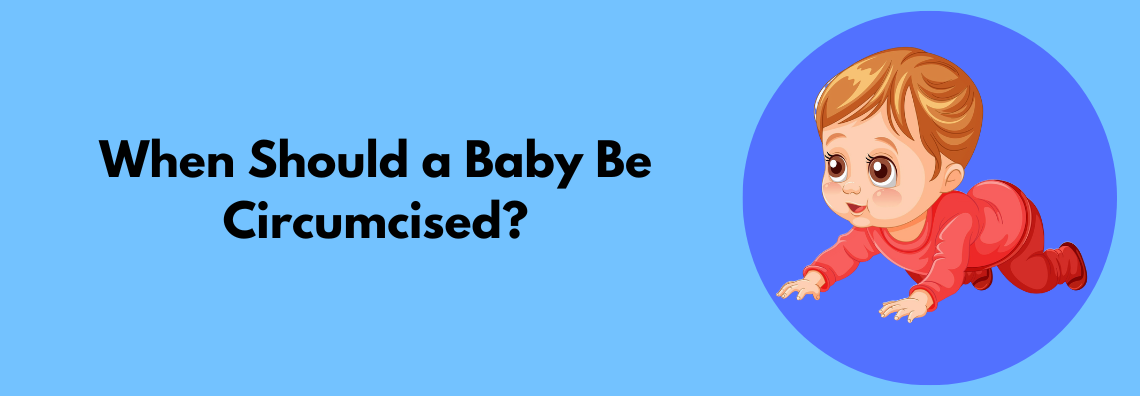
Circumcision, or the surgical removal of the foreskin from the male genitalia, is a common decision many parents have to make after a baby boy is born. It is a consideration for health benefits and it is strongly related to religious, cultural, or personal beliefs.
What is the best time for circumcision? What are the clinical considerations for doing it or not doing it? What are the cultural and religious practices that have transformed this mundane procedure into something very significant? Let’s dig into the topic with clarity and curiosity.
Circumcision Surgery For Baby
Have you given birth to a baby boy or are going to? Wondering when your baby should be circumcised? Well, for a baby circumcision is usually performed within the first few days after birth, typically within the first 48 hours. Circumcision is a relatively simple procedure when it’s performed in the hospital on newborns, and it uses local anaesthesia to avoid causing discomfort. The healing time can be as short as 7 to 10 days.
While it is safe to perform circumcision surgery even later on in life, the procedure is bound to be a bit more complicated, and the healing period may be longer. Older children and adults will feel the effects more, and the procedure is generally performed under general anaesthesia. For such reasons, many parents opt for this procedure primarily for convenience and less complications for the baby.
The First Few Days: Common Period for Circumcision
In most cultures, circumcision of a newborn is done within the first ten days after birth. It might be favoured during this time for the following reasons:
- Convenience: It is an advantage that many parents have their baby circumcised while still in the hospital. This is very popular especially in the United States as it performs circumcision shortly after birth. The mother will be able to tend to the procedure right away, and her infant will heal during that early newborn phase.
- Cultural and religious practices: Some religious traditions are more deeply rooted with circumcision. For example, in Judaism, the procedure is known as a “bris” and ought to be done on the eighth day of life, unless there are health complications. In Islam, there is no specific age established for circumcision, but it is often performed soon after birth or early childhood.
- Easier healing: Compared to older children or adults, newborn babies take shorter healing times and cause fewer pains. New-born babies at such a tender age hardly feel the pain since their bodies are still in rapid healing processes.
Medical Benefits of Circumcision
The issue of the medical benefits of circumcision has been controversial and debated. Its medical benefits outweigh its risks. Some benefits include:
- Less Urinary Tract Infection: Scientists think that male circumcision reduces urinary tract infection risk among males as compared to uncircumcised males.
- Decreased Sexually Transmitted Infections: Studies have established that circumcisions reduce the risk of certain STIs in later life. It has been found to decrease the chances of HIV and other STIs.
- Prevention of Phimosis: The condition wherein the foreskin of the penis cannot retract completely over the head, which may cause pain and infections, is eliminated through circumcision.
Cultural and Religious Influences
Circumcision goes far beyond the medical procedure. It is, after all, deeply entrenched in many religious and cultural traditions. For Jews, circumcision, or “bris,” is a covenantal act that signals the baby’s entrance into the Jewish community. In Islam, it is often considered an affirmation of cleanliness, however, the timing of the procedure varies with culture.
Hygiene circumcision has been a commonly practised procedure in the United States since the 20th century, but among other parts of the world, such as in Europe, it is not as common unless it is for religious reasons.
Ultimately, parents’ decisions based on cultural or religious reasoning tend to be based on tradition, and that is what will dominate their decisions.
Late Circumcision- A Complex Decision
Many parents decide to have newborn circumcision, while others may delay it. There are several reasons for such a decision:
- Cultural disparities: Circumcision is much less prevalent in many other countries. It is sometimes a procedure that occurs later in life for various medical and personal reasons in such regions.
- Medical reasons: Babies born with medical conditions such as hypospadias in which the opening of the urethra is on the underside of the penis. That’s reason enough to wait to circumcise until corrective surgery can be done in one procedure when everything can be fixed.
- Parental indecision: Some parents want to wait for the child to make up his mind when he grows up. Sometimes, this approach comes from a belief that it should be an individual choice especially if there are no serious medical conditions to necessitate early circumcision.
The Bottom Line
The decision to circumcise a baby depends on medical, cultural, and other personal reasons. However, for most parents, the first few days to weeks of the baby is the most common and convenient time when healing would be fast and discomfort for the baby would be minimal.